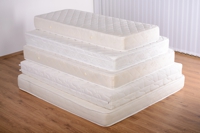 The mattress industry advises that we should probably be changing our mattress every eight years, as by this time our mattress (regardless of visible appearance) would have lost a lot of its original comfort and support. Everyone uses a mattress and most people use it for a good third of their day, so having one with decent back support is important. Good mattresses, however, can get expensive, but luckily, there are always deals available throughout the year.
The mattress industry advises that we should probably be changing our mattress every eight years, as by this time our mattress (regardless of visible appearance) would have lost a lot of its original comfort and support. Everyone uses a mattress and most people use it for a good third of their day, so having one with decent back support is important. Good mattresses, however, can get expensive, but luckily, there are always deals available throughout the year.
See Also: Home Appliances | Kitchen Gadgets
Shops With Mattress Offers
Bed & Mattress Buying Guide

There’s an argument that your bed is the most important piece of furniture that you own. It’s where we go to sleep, of course, but it’s also our refuge when we feel sick, the place we retire to when we just want to lie down and think about our day and, needless to say, the location of some other extra-curricular activity for plenty of people.
Yet how many of us know all that much about our beds? How much did yours cost? What type of mattress do you have? Is it good for your back and so on? Full marks if you were able to answer all of those questions without an issue, but if you struggled then don’t worry too much – so did we.
Here, then, you’ll find our bed and mattress buying guide. We’re going to have a look at the various things you need to think about, the different types of beds and mattresses available and all of the considerations you need to make before you take the plunge on a new bed. Research shows that the right bed and mattress combination could see you getting up to an extra 40 minutes quality sleep – that’s really worth looking into!
To make things easier we’ll have a look at beds specifically first, then we’ll take a closer look at the mattress. It’s possible that you’ve already got a great mattress and just want to find an exciting bed to put it on, whilst it’s equally likely that you quite like the bed you’ve had for the last fifteen years and just want to spend some money on a top quality mattress to go on the top of it. Well stick with us and we’ll guide you through the tricky process, hopefully ensuring you have a great night’s sleep from now on!
Is It Time for a New Bed?
 As you might expect, the lifespan of a mattress changes depending on how much you use it. If you’re the sort of person that finds themselves retiring to their bed for every little thing, whether that be reading a book, watching television or just catching a quick nap after lunch, you might be deteriorating your mattress more than you realise.
As you might expect, the lifespan of a mattress changes depending on how much you use it. If you’re the sort of person that finds themselves retiring to their bed for every little thing, whether that be reading a book, watching television or just catching a quick nap after lunch, you might be deteriorating your mattress more than you realise.
Generally speaking, though, a mattress that is used a typical amount will last for around seven years, so if you’ve had yours for longer than that then yes, you really should consider replacing it. Equally if you’re finding that you’re not sleeping as well as you used to or that you often wake up feeling stiff or in pain then it could be your bed that’s causing your problems.
There are obvious things will let you know it’s time to replace your bed, such as tears, rips and lumps in your mattress. But if you’ve also been to someone else’s house and slept much better than you normally do then it might be worth asking yourself whether that’s just because you thought they were really boring and couldn’t wait to go to sleep, or whether it could be the bed that made the difference.
It’s also worth bearing in mind that changing your mattress alone might not make all of the difference. If your bed’s support is made up of wooden, sprung loaded slats then you might find that a new mattress soon takes on similar properties to your old mattress. That’s because the wooden slats no longer have the same support that they used to, meaning that your mattress falls into the same old grooves and causes you the same old problems.
If you’ve decided that it’s time to get yourself a new bed or mattress then read on! We’ll take you on a journey from where you are now to the comfort of the new.
The Bed Rock
The average person spends around a third of their life in bed. Sufficed to say, then, it’s an important thing to get right. If you work in a high-powered office job you will probably have spent a good amount of time looking for a comfortable, ergonomic chair, so shouldn’t you give the same thought and consideration to your bed’s base?
From divans to bunkbeds, there are numerous choices for the base of your bed. It goes without saying that you’ll need to make sure your bed and mattress can play nicely together if you’re not buying them as a package, so ensure you make a note of the important measurements and so on. We’ll talk about size more specifically when we look at mattresses, but it goes without saying that if you’ve got a double mattress try to make sure you also go for a double bed…
Divans
The most popular base style in the UK, the divan is basically a box with upholstery on it. Oftentimes they are supported either by castors, wheels or legs to allow for some extra storage underneath them. It is a touch more complicated than that, obviously, and you can get several different types of divan depending on what you’re after.
Solid top, or platform top divans are a rigid panel, commonly made from a hardboard of some sort. These are normally quite firm and are typically something of a cheaper option. They’re certainly cheaper than the sprung edged divans that many consider to be the luxury option. These have a spring unit mounted on to the frame, allowing the divan to act as a shock absorber for your movement through the mattress.
One of the key things to think about with a divan is whether it can be used as a good space saver for you. Some divans have a wooden side frame with heavy duty springs contained within them and these can often lift up all of the way. These Ottoman beds allow you to score a whole host of stuff within the body of the bed. They are a bit pricier, but the quality of the bed doesn’t tend to suffer for it.
If an Ottoman seems a bit much for you then keep an eye out for the different variations of divan storage available. From two drawers in either side of the bed to a drawer in the end of the bed itself, with any variation on a theme in between that, there is bound to be a divan with storage options that will suit your needs.
Bedsteads
There are a myriad of choices if you are looking at getting a bedstead. These are essentially frames made from different materials that you then put your mattress on top of. If you want you can look to get an upholstered bedstead, giving you a choice of fabric, cloth or even leather cover to your bed’s frame.
Another option is to go for the solid wood variety of bedstead. The clue is in the title with this one as your frame is made entirely of wood. The real ones will give you a wonderfully natural appearance, and because they’re made of wood no two frames will ever be the same. The grain, colour and knots in the wood mean you’ll have a unique piece of furniture in your bedroom.
Wood frames are, understandably, quite expensive. If you love the idea of a wooden bedstead but can’t afford to pay full whack for one then you might want to consider a wood effect frame instead. Often these have a cheaper material making the frame itself and then a wooden veneer on the top of them. Your bed won’t be unique as the wood effect will be the same colour and appearance as all of the other manufactured wood effect frames from the same family.
It would be a lie to say that all metal frames are cheaper than all wooden frames, but generally speaking metal frames aren’t quite as pricey as their more natural counterparts. Metal frames can be contemporary or old fashioned in their design and are available in virtually any shape, size or colour that you can imagine.
In the ever-evolving world of technological advancements it shouldn’t be a surprise to learn that you can buy a TV bed, yet somehow it is. A TV bed is not, just to avoid any confusion, a bed made out of a television. Rather it is a bed that is specially designed to fit a TV into the base of it, meaning you can sit and watch your favourite show or play on your games console all from the relative comfort of your bedstead.
It’s safe to say that which bed frame you opt for will largely come down to your own personal taste, but there are a couple of other things you need to bear in mind. Firstly, always make sure that you try your mattress out on the style of base that you go for. Different bedsteads offer different levels of support, so you might not always get the support you want from your chosen bed frame.
Secondly, think of how the mattress is going to be supported. Some bed frames support the mattress that goes on top of them with a metal grid, whilst others go with wooden slats or a woven wire. If yours has a slatted base then you should investigate whether they are sprung slats or flat ones. Sprung slats offer additional support, with the ability to adjust the tension of the slats available in the top models. Also, the wider the space in between the slat of your bed frame the quicker it is that your mattress will degrade.
Adjustable Bed
Like Stenna stairlifts and life insurance policies, adjustable beds often have adverts on in the middle of the day, hoping to attract the older audience. Adjustable beds aren’t just for the old, however, with plenty of people seeing them as an option to help support their lifestyle. Do you read, watch TV or consistently eat breakfast in bed? Do you work from home and spend loads of time on a laptop whilst in bed? All of those activities could be aided by having an adjustable bed.
It goes without saying that adjustable beds are wonderful for people with certain medical complaints. They can help your posture, aid in the raising of your legs during sleep or simply assist you in getting out of bed if that’s something you struggle with. Depending on how much you’re willing to pay on an adjustable bed you’ll be able to get one in whatever style you want, that can do whatever you want it to do.
Bunkbeds
As fun as they’ve ever been, bunkbeds remain a popular option for adults and children alike. Perhaps you have a small spare room and would like somewhere for guests to stay when they visit but you also need room for an office. A bunk bed would do the trick, allowing you to have a bed up top with a computer and desk underneath. What’s not to love?
Of course more often that not bunkbeds are aimed at the kids, and you’ll find there are plenty of bed options for the little ones. Some bunkbeds have a bed up top and below, others choose to use the space below to make a fun play zone for your child’s toys. Which you opt for will really depend on how many kids you’ve got or whether you love one loads more than the other.
Guest Beds
Obviously if neither money nor space are a problem for you then you’ll be able to have a normal bed frame in your spare room for your guests to use when they come around. If, however, you’re looking for a space or money saving option that you can turn to when you have visitors then we’ll give you some ideas now.
An airbed remains a solid choice for a spare bed. You can get them in single or double sizes, can pump them with foot pumps or electric pumps and have a number of other options to boot. Did you know, for example, that you can now get airbeds that have different compartments in either side? So when one side inevitably deflates during the night at least the other side will still be well and truly pumped up until the morning. They are not exactly high-quality, but they are often more than comfortable and, of course deflate nicely so you can store them easily enough.
Another option for your guest might be a foldaway bed. These normally entail a metal frame with wire slats and a think mattress on top, allowing for the whole thing to be folded together and stored away somewhere neatly. As you’d no doubt expect, the quality of folding beds alters with how much you’re willing to spend on them. Some have wooden slats, for example, whilst others even go so far as to have a built-in headboard. Typically folding beds are only available as a single, so that’s something worth considering.
Hideaway beds can also come in handy. These tend to be full on beds with their own foldaway legs that, once collapsed, slip nicely under your own full-sized bed. Often these beds are part of a package, so the hideaway bed will be of a similar style and design to your main bed. They are all part of the same frame, so this normally means that you’ll sacrifice storage space in exchange for a hidden bed. You can buy them separately, of course, but they might look a bit weird.
Bed Settee
More commonly called sofa beds, bed settees are a great choice if you want to get yourself a new couch and a new bed at the same time. These beds are normally not the most comfortable in the world, though as always the more you spend the more support and comfort they will offer.
The point of a sofa bed is that it is there for occasional use rather than as a solution to all of your problems. They’ll be fine for that mate of yours who always has a little bit too much to drink and falls asleep at your parties, but you might struggle if said mate says they want to move in permanently.
Size-wise the options are almost limitless. There are now chair beds that will fold down to become single beds as well as large sofas that become king-size beds. Typically the back moves a bit and the front folds right down, so do bear in mind that you’ll need a bit of space either side of the sofa if this is the spare bed you opt for.
The other option that ticks both boxes is the futon bed. These Japanese-style beds are made up of a thick, comfortable mattress that can fold up to sit on a wooden frame and become a couch of sorts. When you want them to, though, both mattress and frame fold down to become a low lying bed. Not everyone loves the futon design and it’s reasonably fair to suggest that if you buy a cheap futon you’ll have an uncomfortable couch that becomes an even more uncomfortable bed. On the flip side, however, if you do well in the market you’ll have a really lovely, stylish bed and couch combo.
The Mattress Matters
Now that you’ve found the perfect bed for your mattress to go on, you need to pick the ideal accompaniment for it. The options in the world of the mattress are nearly as numerous as the choices available in bed frames, so we’ll try to give you as clear a look at the market as we can. It’s unlikely this will be definitive, though, so don’t complain if you already know what type of mattress you want and yet can’t spot it in our list.
That said, it’s worth bearing in mind that some manufacturers like to give the same style of mattress a different name to other manufacturers, the naughty little devils. Do make sure you read our descriptions of things, then, and not just the headlines. Hopefully that will give you a clearer indication of what’s available on the market.
Size Matters
The most important thing you need to decide is how big you want it to be. Your mattress, that is, I’m afraid we can’t help in any other department. There are typically six main bed sizes available in the UK. Which one you want to go for will depend on who’s going to be using it and what it’s going to be used for.
Single beds come in two different sizes: Single and small single. A small singe tends to be around 2 foot 6 inches by 6 foot 3 inches, whilst a normal single is 3 foot by 6 foot 3 inches. As you can tell, it’s the width rather than the length that makes them a small single.
Double beds also come in two sizes: Double and small double, though the small double is often more commonly known as a 3/4 size bed. In the case of the small double you’ll be looking at measurements of around 4 foot by 6 foot 3 inches. For the normal double, on the other hand, you’ll find a bed that is still 6 foot 3 in length but is more like 4 foot 6 inches in width.
The final size variation in the UK is the king or the super king. The former will be around 5 foot wide by 6 foot 6 inches long, whilst the super king will have an extra foot in width, making it 6 foot wide by 6 foot 6 inches long.
If you share your bed with someone then it’s worth thinking about whether you’re able to sleep in your bed without disturbing them. The Sleep Council of the UK recommend that you should be able to lie next to your partner and both put your arms behind your head with your elbows sticking out without touching each other. They also say that, length-wise, your bed should be about 4 to 6 inches longer than whoever is taller in the relationship.
Here’s a fact for you: Two people who share a typical double bed will only have the same amount of personal sleeping space as a new baby in its cot. Worth thinking about if you like your personal space. Something else worth considering is the fact that some manufacturers will make specialist beds for partners of different weights. Anything more than a 3 stone difference between you and the person you share a bed with and you might want to consider getting a mattress that is basically two single beds stitched together. This will allow you to each pick the mattress tension that best suits your needs.
The Type Is Right
So you’ve chosen your bedstead, you’ve figured out which size bed you need and you’re ready to click ‘buy’ on your new mattress/bed combo, but what type of mattress is the one for you? In a basic sense mattress come in two different designs: Foam mattresses and sprung mattresses. To make matter more complex, though, spring mattresses then come with their own options, too.
Foam mattresses are made using a layer of latex or memory foam material and PU foam. They are one of the most comfortable types of mattress as they usually mould around your body, giving you great support and relieving pressure in certain areas.
Sprung mattresses, meanwhile, are the more traditional type of mattress that you might be used to. These normally have metal springs in them to give you your comfort and the support you need whilst you’re sleeping. A solid rule of thumb is that the more springs there are in a sprung mattress the firmer it will be.
As far as the different options of sprung mattress are concerned you’re typically looking at open coils, continuous springs, zoned mattress and pocket sprung mattresses. Open coil mattresses are the entry-level option, if you like, offering good value as the mattress contains large, open springs that are all over the inside of the mattress itself.
Continuous spring mattresses allow for a smooth feel to your rest as they are made from a single length of wire that is knitted into numerous springs, giving you a responsiveness that you wouldn’t get from the open coil variety. Zoned mattresses, meanwhile, consist of a series of zones of spring that move individually from each other to give your body the support it needs in the place it needs it. The final option is a pocket sprung mattress. This features individual springs that tend to be held in place by fabric, stopping the possibility of any of the springs rolling together. This is a durable, comfortable mattress type that you should really consider if you’ve got any back issues.
The other types of mattress that might be worthy of your consideration are gel mattress and flotation beds. The latter are also better known as water beds, and the amount of support they offer is determined by the amount of water used. Gel mattresses, on the other hand, are becoming more and more popular and involve new technologically advanced gel-filled mattress that allow for breathability and pressure relief. Both of these options are good for people that suffer from allergies.
A Happy Finish
The way the mattress is finished makes all the difference for how it feels when you’re actually lying on top of it. There is a layer between the springs and you that dictates this finish, with many different options available for your consideration.
A micro quilted finish is the one you’re probably most used to sleeping on. This entails layers of material in a stitched pattern keeping the springs in place. You can go for a deep quilt instead, if you’d prefer. In that case you’ll find a similar thing to the micro quilting but in a deeper and thicker variation. This variety is certainly a lot more comfortable than the micro quilted mattress, but you’d figured that out already from the name hadn’t you?
Next in the line of comfortable finishes comes the cushiontop mattress. This features an integrated layer of sumptuous, cushioned padded fibres. If you want to go to the next extreme then you’ll find a pillowtop mattress. This gives you an extra layer again, creating a mattress that is very soft indeed.
A tufted finish gives your mattress a firmer feel. This is because the mattress is tufted from the top to the bottom layers, holding all of the fibres where they are. You can add a memory foam or latex finish to the top of a spring loaded mattress for added comfort. Memory foam layers are heat sensitive and, as the name suggests, remember how you lie on the bed. Latex, meanwhile, responds to you movement and can help you sleep better if you tend to be restless or to toss and turn when you sleep.
Getting Support
Generally speaking, manufacturers offer their mattresses in soft, medium or firm varieties. Some will go the extra mile and add in medium/firm or extra firm variations, but they’re just showing off. Comfort is one of those ‘tom-ate-oh’ – ‘tom-ah-toe’ type things, though, with each person having their own preference. If you suffer from a bad back, though, it might be worth seeking medical advice about what type of mattress you should get.
There is no industry standard for what makes a mattress feel soft or firm so it changes from one mattress maker to the next. There really is no substitute for going and lying on your chosen mattress, so make sure you get down to the shops if you’re able to.
As a general rule of thumb, the heavier you are the firmer your mattress should be. If you’re looking for a way to tell if your mattress is the right degree of firmness then lie on it and see if you can slip you hand into the small of your back. If it goes in too easily then your mattress is too hard. If it can’t go in at all, on the other hand, then your mattress is almost certainly too soft. Then, like Goldilocks when she decided to break and enter into the house of that family of bears, if you can move your hand around with a small degree of resistance then your bed is probably just right.
How to Choose the Right Mattress
A truly quality bed and mattress combination is not only an investment in comfort but it could also be an investment in your future health. Bad posture, sore backs and even issues with legs and knees can often be explained by the wrong bed.
If you’re looking at getting a new bed and mattress then here’s something else that the British Sleep Council say: A mattress should last around 7 years before it needs to be replaced, so if it were to last the duration of its life then for every £100 more you spend initially it only actually works out at around 2.7 pence per night. Not a bad investment in the long term.
From memory foam to open coil, Ottoman divan to wood effect bedspread, your options are numerous. The best advice we can give is that it’s worth heading to a bed specialist, making a list of the things that you find most comfortable or aesthetically pleasing and then coming home and seeing what deals you can find on your options here on the web. Happy hunting and, hopefully, sleep well!





